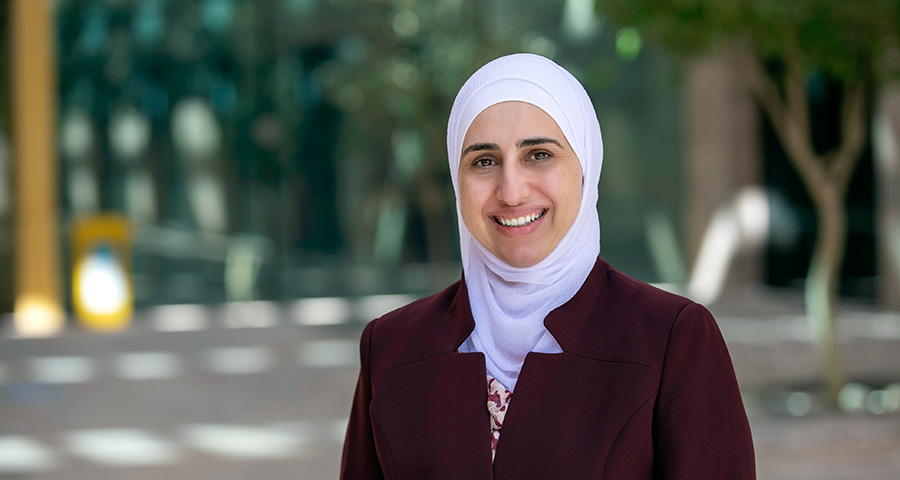
In the news: CMU-Q expert sees great potential for Qatar’s resilient supply chain
Originally published in Qatar Tribune, May 23, 2023 by Meriam Jelliti
Three transformative events — the blockade, the pandemic and the FIFA World Cup — have put Qatar’s supply chain to the test like never before. These challenges have not only posed significant obstacles but have also presented an opportunity for Qatar to showcase its resilience and innovative approach to supply chain management.
In an exclusive interview with Qatar Tribune, Dr Iman Adeinat, a renowned expert in logistics and supply chain, and assistant teaching professor of operations management at Carnegie Mellon University in Qatar (CMU-Q), talked about the recent events that have shaped Qatar’s supply chain landscape and explored how the country has successfully navigated these extraordinary circumstances.
Dr Adeinat shed light on the strategies employed, the lessons learned and the innovative solutions that have emerged. Moreover, she discusses the way forward for Qatar’s supply chain, now that the blockade, the pandemic and the World Cup appear to be in the rearview mirror.
Dr Adeinat has taught operations management in the Gulf region for a decade, first at King Abdulaziz University in Jeddah, and at CMU-Q since 2021. With a PhD from the University of New Orleans in engineering management, Dr Adeinat is an expert in logistics and supply chain, with a special focus on the Gulf region.
Can you explain how the blockade, pandemic and World Cup have impacted Qatar’s supply chain over the past few years?
The blockade, the pandemic and the World Cup all presented significant challenges to Qatar’s supply chain over the past few years. In response, Qatar innovated, making significant improvements to its supply chain infrastructure, including developing new ports and logistics hubs. The country also invested heavily in technology and automation to improve efficiency and reduce costs.
Qatar’s National Vision 2030 includes ambitions to better position the country as a global hub for logistics and transportation, develop local industry and implement sustainable supply chain practices. In fact, given its growing logistics industry and multiple major transportation hubs, the country is well-positioned to serve as a gateway between Asia, Europe and the Middle East.
What were some of the most significant challenges that Qatar faced in terms of logistics and supply chain management?
Qatar’s economy is heavily dependent on the oil and gas sector, which accounts for more than 60 percent of its GDP. This has historically shaped the country’s supply chain strategies, with much of its supply chain focused on exporting hydrocarbons. However, Qatar is now working to diversify its economy and promote the growth of non-oil sectors, which will require a shift in supply chain strategies.
Qatar faced a blockade in June 2017, which led to the closure of land borders and the suspension of air and sea travel between Qatar and GCC countries. Given the heavy reliance on imports from these neighbouring countries, Qatar’s imports from the GCC countries were valued at around $11.5 billion in 2016, or approximately 13.6 percent of Qatar’s total imports, according to data from the International Trade Centre. As a result, Qatar’s supply chain suffered severe disruption. In an effort to mitigate negative impact, Qatar became more self-sufficient by investing over $200 billion in various infrastructure projects, including the expansion of Hamad Port, the construction of the Qatar Rail network, and the development of the Free Zones Authority to accommodate more trade with other countries.
With closed borders and a decrease in international trade leading to supply chain disruptions across the globe, the COVID-19 pandemic further exacerbated the challenges facing Qatar’s supply chain. As a small country relying heavily on imports for many essential goods and services, Qatar was particularly vulnerable to the effects of the pandemic. However, the country took steps to mitigate the impact by increasing its domestic production and investing in local industries. Additionally, by diversifying its trade routes and so reducing its reliance on any given single supplier or transportation route, Qatar decreased the risk of disruptions due to pandemic-related events such as border closures and shipping delays.
How can Qatar strike a balance between its aspirations to become a global logistics hub and its commitment to sustainability?
Emerging business models offer significant opportunities for Qatar to create a more efficient and resilient supply-chain ecosystem. For example, Qatar can take advantage of the circular supply chain model, which involves the use of closed-loop systems to recycle and reuse materials, also, the sharing economy model, which can be implemented in areas such as transportation, logistics and warehousing, leading to more efficient use of resources and reduced carbon emissions.
How do you see Qatar’s supply chain evolving in the next 5-10 years?
The Qatar National Vision 2030 aims to promote sustainable supply chain practices with giving priority to environmental protection, social responsibility and economic viability. This will help to reduce the environmental impact of the country’s economic activities and ensure a supply chain structure that is resilient and adaptable.
